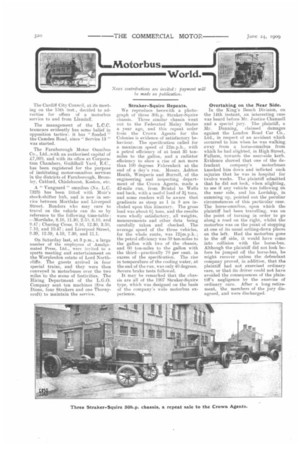Motorbus World.
Page 8

If you've noticed an error in this article please click here to report it so we can fix it.
The Cardiff City Council, at its meeting on the 15th inst., decided to advertise for offers of a motorbus service to and from Llandaff.
The management of the L.C.C. tramcars evidently has some belief in opposition tactics: it has " flooded " the Camden Road, since" Service 13" was started.
The Farnborough Motor Omnibus Co., Ltd.,with an authorised capital of .C7,000, and with its office at Corporation Chambers, Guildhall Yard, E.C., has been registered for the purpose of instituting motor-omnibus services in the districts of Farnborough, Bromley, Catford, Chislehurst, Keaton, etc.
A " Vanguard " omnibus (No. L.C. 7323) has been fitted with Muir's shock-shifter hub, and is now in service between Mortlake and Liverpool Street. Readers who may care to travel on the vehicle can do so by reference to the following time-table: —Mortlake, 8.16, 11.30, 2.50, 6.10, and 9.47; Charing Cross, 9.16, 12.30, 3.50, 7.10, and 10.47; and Liverpool Street, 9.39, 12.59, 4.19, 7.39, and 11_1.
On Saturday last, at 3 p.m., a large number of the employees of Amalgamated Press, Ltd., were invited to a sports meeting and entertainment on the Worplesdon estate of Lord Northcliffe. The guests arrived in four special trains, and they were then conveyed in motorbuses over the two miles to the scene of festivities. The Hiring Department of the L.G.O. Company sent ten machines (five de Dions, four Strakers and one Thornycroft) to maintain the service.
Straker-Squire Repeats.
We reproduce herewith a photograph of three 30h.p. Straker-Squire chassis. Three similar chassis went out to the Federated Malay States a year ago, and this repeat order from the Crown Agents for the Colonies is evidence of satisfactory behaviour. The specification called for a maximum speed of 12m.p.h., with a petrol efficiency of at least 35 tonmiles to the gallon, and a radiator efficiency to show a rise of not more than 100 degrees Fahrenheit at the end of a day's run. Messrs. Ashton Heath, Wimperis and Burrell, of the engineering and inspecting department of the Crown Agents, made a 42-mile run, from Bristol to Wells and back, with a useful load of 31tons, and some readers will be aware that gradients as steep as 1 in 8 are included upon this itinerary. The gross load was about 61 tons, and the results were wholly satisfactory, all weights, measurements and other data being carefully taken and checked. The average speed of the three vehicles, for the whole route, was 12im.p.h. ; the petrol efficiency was 59 ton-miles to the gallon with two of the chassis, and 60 ton-miles to the gallon with the third—practically 70 per cent, in excess of the specification. The rise in temperalure of the cooling water, at the end of the run, was only 40 degrees. Severe brake tests followed.
It may be remarked that the chassis are all of the 1907 Straker-Squire type, which was designed on the basis of the company's wide motorbus experience. Overtaking on the Near Side.
In the King's Bench Division, on the 14th instant, an interesting case was heard before Mr. Justice Channell and a special jury. The plaintiff, a Mr. Dunning, claimed damages against the London Road Car Co., Ltd., in respect of an accident which occurred to him when he was walking away from a horse-omnibus from which he had alighted, in High Street, Fulham, towards the near-side kerb. Evidence showed that one of the defendant company's motorbuses knocked him down and inflicted such injuries that he was in hospital for twelve weeks. The plaintiff admitted that he did not look, when alighting, to see if any vehicle was following on the near side, and his Lordship, in. summing up, pointed out the peculiar circumstances of this particular case. The horse-omnibus, upon which the plaintiff had been travelling, was on the point of turning in order to go along a road on the right, whilst the motorbus was on the point of stopping at one of its usual setting-down places on the left. Had the motorbus gone to the off side, it would have come into collision with the horse-bus. Although the plaintiff did not look before be jumped off the horse-bus, he might recover unless the defendant company proved, in addition, that the plaintiff had not exercised ordinary care, or that its driver could not have avoided the consequences of the plaintiff's negligence by the exercise of ordinary care. After a long retirement, the members of the jury disagreed, and were discharged.
































